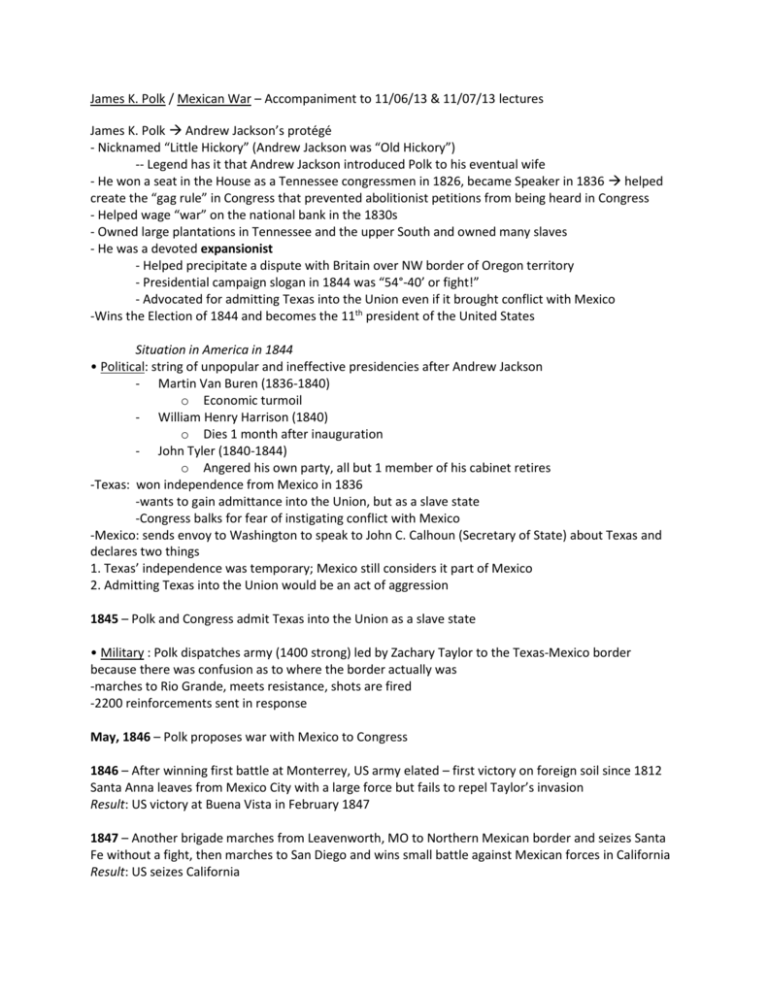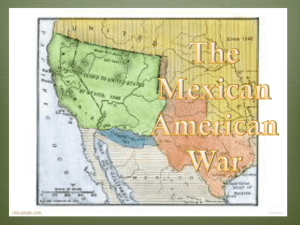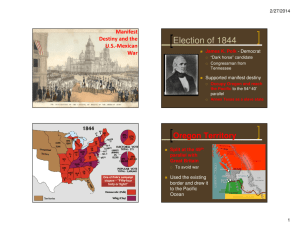USH Mex War_classnotes
advertisement

James K. Polk / Mexican War – Accompaniment to 11/06/13 & 11/07/13 lectures James K. Polk Andrew Jackson’s protégé - Nicknamed “Little Hickory” (Andrew Jackson was “Old Hickory”) -- Legend has it that Andrew Jackson introduced Polk to his eventual wife - He won a seat in the House as a Tennessee congressmen in 1826, became Speaker in 1836 helped create the “gag rule” in Congress that prevented abolitionist petitions from being heard in Congress - Helped wage “war” on the national bank in the 1830s - Owned large plantations in Tennessee and the upper South and owned many slaves - He was a devoted expansionist - Helped precipitate a dispute with Britain over NW border of Oregon territory - Presidential campaign slogan in 1844 was “54°-40’ or fight!” - Advocated for admitting Texas into the Union even if it brought conflict with Mexico -Wins the Election of 1844 and becomes the 11th president of the United States Situation in America in 1844 • Political: string of unpopular and ineffective presidencies after Andrew Jackson - Martin Van Buren (1836-1840) o Economic turmoil - William Henry Harrison (1840) o Dies 1 month after inauguration - John Tyler (1840-1844) o Angered his own party, all but 1 member of his cabinet retires -Texas: won independence from Mexico in 1836 -wants to gain admittance into the Union, but as a slave state -Congress balks for fear of instigating conflict with Mexico -Mexico: sends envoy to Washington to speak to John C. Calhoun (Secretary of State) about Texas and declares two things 1. Texas’ independence was temporary; Mexico still considers it part of Mexico 2. Admitting Texas into the Union would be an act of aggression 1845 – Polk and Congress admit Texas into the Union as a slave state • Military : Polk dispatches army (1400 strong) led by Zachary Taylor to the Texas-Mexico border because there was confusion as to where the border actually was -marches to Rio Grande, meets resistance, shots are fired -2200 reinforcements sent in response May, 1846 – Polk proposes war with Mexico to Congress 1846 – After winning first battle at Monterrey, US army elated – first victory on foreign soil since 1812 Santa Anna leaves from Mexico City with a large force but fails to repel Taylor’s invasion Result: US victory at Buena Vista in February 1847 1847 – Another brigade marches from Leavenworth, MO to Northern Mexican border and seizes Santa Fe without a fight, then marches to San Diego and wins small battle against Mexican forces in California Result: US seizes California 1847 – US Navy touches down at Veracruz (same place Cortez landed 300 years earlier) dispatches troops led by Winfield Scott to march to Mexico City Result: Mexico City surrenders, war over February, 1848 – Treaty of Guadalupe Hidalgo signed Controversial because Mexico is forced to cede present-day New Mexico, most of Arizona, California, Nevada, Utah, Colorado, for the price of $15 million. --- Interestingly, gold was discovered in California in 1848 just in time for the US to reap the benefits Facts about the War ~115,000 US soldiers served ~1700 kia Not one battle was fought on US soil Names of soldiers who fought: 1. Ulysses Grant 3. Jefferson Davis 2. Zachary Taylor 4. Robert E. Lee 5. Thomas “Stonewall” Jackson Conclusions: America was clearly the aggressor and revealed its expansionist intentions in the aftermath of the war. The Treaty ending the war was exceptionally beneficial to the United States and compensated Mexico a measly $15 million for nearly half their land. How can we view Manifest Destiny in light of these events? The US just waged an aggressive war on a Catholic, Democratic country that had abolished slavery as early as 1821. James Polk was a wealthy slave-owner who had a lot to gain from strengthening the political position of slave interests. How might the conclusion of the Mexican-American War complicate issues over slavery in the near future?






